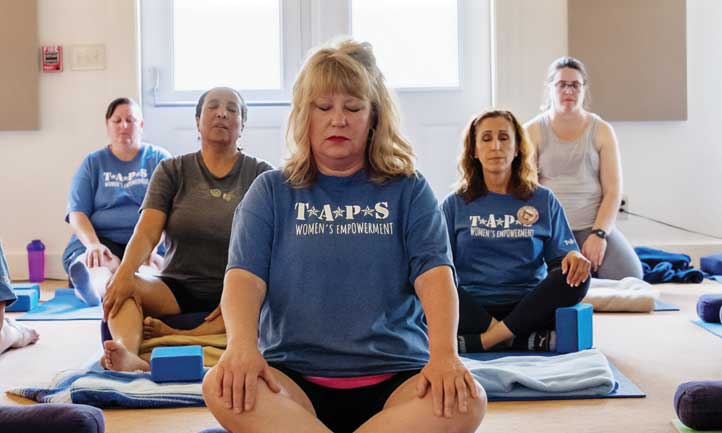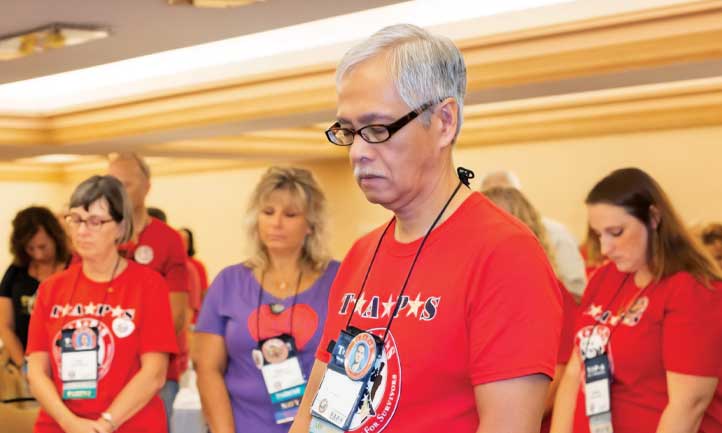You’re Not Crazy — You’re Grieving — Part Five
Author: Alan Wolfelt
Editor's Note
This is part five of a six-part series adapted from Dr. Alan Wolfelt's book, You're Not Crazy — You're Grieving.
Parts one through four were published in the summer 2023, fall 2023, spring 2024, and summer 2024 issues of TAPS Magazine.

In early grief, existential questions tend to naturally arise. Why did the person have to die? Why now? Why in this way? Why does anyone live and die? Why are we here? I often say why questions naturally precede how questions. “Why did this happen?” instinctively comes before “How will I survive this loss?”
It is normal to try to make sense of things — to try to understand. It is normal to wonder about and search for the meaning of life — your life, the life of the person who died, and life in general.
It is also normal to wrestle with the difficult feelings that can accompany these kinds of thoughts after a death. Anger, sadness, guilt, despair, frustration, and even awe and joy often go hand-in-hand with searching, questioning, and sometimes discovering insights about meaning.
Most why questions and concerns after a death are esoteric in nature. In other words, they’re spiritual. They’re spiritual because they can’t be answered with concrete facts and hard sciences. Instead, they have to do with our innate sense that there may be something bigger or greater than us at work in our lives and in the universe. Perhaps, we think, there is something cosmic or divine that we are all a part of in some hard-to-fathom or even unknowable way.
It is important to acknowledge that spirituality and religiosity are not synonymous. In some people’s lives, they overlap completely — their religious life is their spiritual life. Other people have a rich spiritual life with few or no ties to an organized religion. Still others may not consider themselves “spiritual,” but have a philosophy of life they live by.
Obviously, each of us needs to define our own spirituality in the depths of our hearts and minds. Regardless of your beliefs, spiritual practices can help you survive the early months as well as profoundly enrich the remainder of your days.

Searching for Answers and Learning to Live with Uncertainty
In the early weeks of grief, many people struggle with finding reasons to get out of bed in the morning. This is mostly a practical, not spiritual, kind of searching. Anything that helps you feel safe and comforted is probably also a reason to get out of bed in the morning. If the thought of a cup of your favorite tea or sitting outside in the sun gets you out of bed, great. If meeting your best friend for lunch appeals to you, excellent. I urge you to be generously compassionate with yourself by sprinkling your day with activities and incentives that will help you get from one hour to the next.
In the more spiritual kind of searching in grief, however, there generally aren’t easy answers to the grand why questions. Sometimes there aren’t answers period. I like to say that instead of pinning down understanding in grief, we often have to get more comfortable with standing under the mystery. That’s one of our chief challenges in grief, in fact — learning to live with not knowing and uncertainty.
But even if there aren’t answers, there is still a lot of value in the search. Simply by exploring your questions and looking for answers, you are allowing yourself to authentically mourn. Ideally, you’re talking to other people about your search. You’re expressing your feelings about your questions and frustrations. And, as you’re doing so, you’re building and strengthening bonds of friendship and love.
What’s more, you might sometimes find glimmers of answers along the way. You may well discover or work toward a way of viewing things that begins to help you make peace with what happened. Any core beliefs you had before the death might be tested, changed, or strengthened. This is all to say that searching for spiritual understanding and meaning is normal and healthy in grief.
Taking Care of the Spiritual Self
When I’m counseling someone who’s grieving, I always encourage them to build spiritual practices into their everyday routines. Even just 10 minutes a day devoted to caring for their spirit can have a profound impact on their healing and well-being.
So for you, which spiritual practices clear your head, help you feel grounded, and nurture your divine spark? Here’s a list of ideas to consider incorporating into your days:
- Go for a walk in nature.
- Attend religious or spiritual services.
- Speak with a clergyperson or other spiritual leader.
- Sit outdoors somewhere beautiful.
- Breathe deeply.
- Listen to music that speaks to your soul.
- Do something good for your body.
- Write in a journal.
- Pay attention to your five senses in this moment.
- Pray.
- Meditate.
- Make something.
- Spend time with someone who loves you.
- Do something that makes you feel hopeful.
- Help someone else.
- Watch the sun rise or set.
- Read a spiritual text.
- Practice yoga.
- Garden.
- Get a massage.
- Give a gift.
- Read or write poetry.
- Express gratitude.
You can do a spiritual practice and be mourning at the same time. For example, you can pray about your loss. Or, you can spend time talking about the loss with a loved one. Grief and spirit work together are often a particularly powerful combination.

Embracing Mystical Experiences
Mystical experiences are common in grief, and they often give comfort to grieving people. And sometimes, because they fall into the realm of the supernatural, they make some people feel crazy! If you’ve had mystical experiences having to do with the death or the person who died, you’re not alone, and you’re not crazy.
It is not unusual for people experiencing grief to feel they’re being contacted by the person who died, for example. If the person doesn’t show up themselves in some way, such as a dream or fleeting glimpse, then a sign or symbol from them does.
Sometimes this sign comes in the form of a bird or animal. When a cardinal, fox, or butterfly, for example, suddenly appears in their yard or path, they might take it as a sign from the person who died that they are safe and well.
Other times the sign comes in the form of a familiar smell or sound, a found object, or a natural phenomenon, such as a rainbow. Such synchronicities often feel mystical when we are searching for meaning.
There are a few different ways to think about these mystical experiences.
One is that you are, in fact, receiving real communications from the beyond. The person who died or other spiritual beings are contacting you, usually to give you reassurance that all is well.
Another way to think about these experiences is that mysterious happenings are just that — mysterious. We can’t know why these things happen, but we can acknowledge that they do happen. We can stay open to the mystery without needing to fully understand.
You get to decide how to think about your mystical experiences. When other people share their mystical experiences with you, you also get to decide how to understand and respond. Keep in mind, of course, the principle that all grief is unique and valid. There is no wrong or right answer.
I would encourage you, however, to be open-minded and pay attention to how these experiences make you feel. If they make you feel better or curious, then choosing to embrace them is probably a good spiritual self-care decision for you. Pondering and exploring them further can also help you continue to search for meaning.

Dealing with Dreams and Nightmares
We can think of grief dreams as a subset of mystical experiences. And as with all mystical experiences in grief, you can choose to think of any grief dreams you might have however you would like. As always, you get to decide.
Obviously, pleasant grief dreams are easier to live with than bad dreams or nightmares. Nightmares might make you feel especially crazy. If you’re having bad dreams about the death or person who died, I encourage you to talk about the dreams with people who care about you. If your nightmares are recurring or often intrude on your waking thoughts and feelings, I encourage you to see a grief counselor to help you explore them. As we’ve discussed, getting good rest is essential for your body in early grief. If your dreams are preventing you from reaching restorative sleep, it’s also a good idea to discuss this issue with your primary care provider.
Finding Healing in Rituals
I often find that additional rituals after the funeral can be helpful in surviving early grief. What do I mean by rituals? I simply mean actions that we perform in a certain way and in a certain sequence. We perform them for a purpose that has emotional and spiritual meaning and is greater than the sum of its parts.
Grief rituals don’t have to be formal ceremonies, though. In fact, most of them can be brief, informal, and simple.
One example is what I call the “10-Minute Grief Encounter Ritual.”
- Find a quiet space and center yourself.
- Set your intention for the ritual on that day — to feel more calm or appreciate the love you still have for the person who died, for example. It can be anything you want.
- Name the grief feelings you are having in that moment, and acknowledge their normalcy. Try this while holding or looking at a symbol of the person who died, such as a photo or article of clothing. You might say something like, “I am feeling afraid. Fear is a natural part of grief.”
- Place your free hand over your heart, pressing gently as you name each new thought and feeling. Then, allow your hand to fall to a resting position again.
- Pray these thoughts and feelings instead — if you’re someone who prays — as you step through the ritual.
- Continue feeling, naming, and exploring your emotions for five to 10 minutes. When the time is up, take a moment to express your gratitude for anything authentic you thought, felt, and acknowledged during the ritual.
- Close with an affirmation that restates the intention you set at the beginning of the ritual, but this time as a present truth. For example, “I love [name your person who died]. I am capable of grieving and loving and healing all at the same time.”
The amazing thing about grief rituals is that they naturally facilitate healing. This is especially true when they’re done regularly, day in and day out. I urge you to give them a try. I have seen them work effectively many times in the lives and hearts of grieving people. In fact, ritual is so effective in grief that when I meet a griever who is especially struggling, I often recommend additional rituals as well as talk therapy.
If you’re someone who’s not already comfortable with spiritual practices, the idea of grief rituals might sound a little crazy. But embracing the crazy is what this article series is all about, right? You’re not really crazy, and grief rituals aren’t either.

Join a TAPS Support Group
TAPS can connect you with compassionate peer groups that will listen and walk with you through the spiritual how and why questions and every other step along the path of grief. Connect with other survivors online or in a care group near you.
Dr. Alan Wolfelt is recognized as one of North America's leading death educators and grief counselors. His books on grief for both caregivers and grieving people — including You're Not Crazy — You're Grieving, from which this article series is adapted — have sold more than a million copies worldwide and are translated into many languages. He is the founder and director of the Center for Loss and Life Transition and a TAPS Advisory Board Member. To learn more, visit centerforloss.com.
Photos: TAPS Archives
